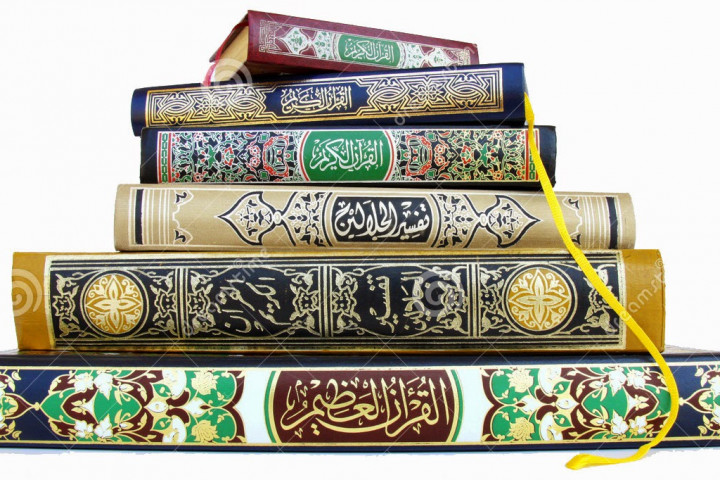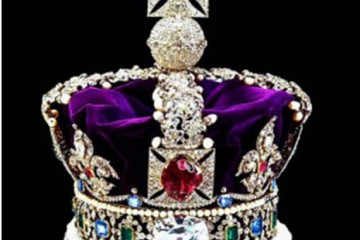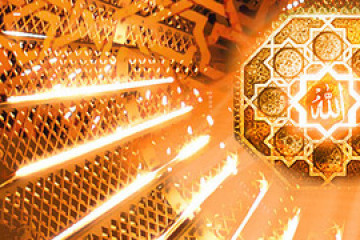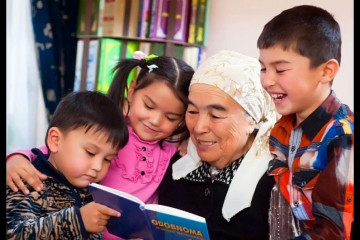
ABU HANIFAH رَحْمَةُ الـلّٰـهِ عَلَيْه, THEGREATEST SCHOLARINTHEWORLDOFISLAM
ABU HANIFAH رَحْمَةُ الـلّٰـهِ عَلَيْه, THEGREATEST SCHOLARINTHEWORLDOFISLAM
It is without doubt that no other Scholar has attained the same proficiency in the science of Fiqh as the founder of the Hanafi School of Thought, Imaam Abu Hanifah رَحْمَةُ الـلّٰـهِ عَلَيْه. According to most sources, Abu Hanifahرَحْمَةُ الـلّٰـهِ عَلَيْه was born in Kufa in 80 AH.Imaam Abu Hanifah's name was Nu'maan At-Teemi Al-Kufi. His father and his grandfather, Nu'maan bin Mirzabaan, were amongst the noblemen of Kabul and possessed deep insight and intellect. They embraced Islam during the Caliphate of Hadhrat Ali r.a. and migrated to Kufah. They had a very close relationship with Hadhrat Ali r.a. The family of Imam Abu Hanifah رَحْمَةُ الـلّٰـهِ عَلَيْه established bonds of friendship with the renowned and respected tribe of Banu Teem and became known as Teemi. Due to the honour and status of the individuals of this tribe they became known as "Masaabeehuth Thulm" (the chandeliers which remove darkness). Abu Hanifah رَحْمَةُ الـلّٰـهِ عَلَيْه grew up in Kufa and was educated there and lived most of his life there as a student, debater and teacher. Throughout his life he engaged in trade because his father was a merchant so Abu Hanifah رَحْمَةُ الـلّٰـهِ عَلَيْه followed his father’s occupation. In his early childhood, he memorized the Qur’an. It is reported that he used to recite the entire Qur’an seven times in the month of Ramadan. Many sources report that he learned recitation from Imam ‘Asim, the source of one of the seven recitations qira’at of the Qur’an.
During Hajj, Imam Abu Hanifah رَحْمَةُ الـلّٰـهِ عَلَيْه met a companion of Rasulullaah s.a.w., Hadhrat Abdullaah bin Haarith bin Juz r.a., from whom he heard and narrated ahadeeth. Imam Abu Hanifah رَحْمَةُ الـلّٰـهِ عَلَيْه said, “I was born in 80 A.H and performed Hajj with my father in 96 A.H when I was sixteen years old. When we entered the Masjid-ul-Haram, I saw a discourse being conducted and I asked my father who was the man conducting it. He replied that it was Abdullaah bin Haarith bin Juz r.a., a Sahabah of Rasulullaah s.a.w. As soon as I heard this, I went forward and joined the discourse. I heard him say, “I heard Rasulullaah .s.a.w. say that whoever attains Faqaahat (proficiency in Jurisprudence) Allah will fulfil his needs and grant him sustenance from where he will perceive not.” Imam Ibn Qayim has written in “A’alaamul Muqi’een” that Fiqh, Deen, and knowledge has spread in the Ummat through the students of Hadhrat Abdullaah bin Mas'ood r.a., Hadhrat Zaid bin Thaabit r.a., Hadhrat Abdullah bin Umar r.a and Hadhrat Abdullah bin Abbas r.a. The people of Madinah attained their knowledge from the students of Hadhrat Abdullah bin Umar r.a. and Hadhrat Zaid bin Thaabit r.a., the people of Makkah attained their knowledge from the students of Hadhrat Abdullah bin Abbas r.a. and the people of Kufah from the students of Hadhrat Abdullah bin Mas'ood r.a. As is seen from the historical sources, there were three fields of knowledge at that time: circles which discussed the fundamentals of dogma, which was the arena of the different sects; circles which studied the hadiths of the Messenger of Allah, peace be upon be and circles which deduced fiqh from the Book and Sunna and gave fatwa about things which arose. when he devoted himself to knowledge, he turned to fiqh after examining all the sciences which were known at that time. Two other versions clearly state that he first selected the science of kalam and debated with the sects and then Allah directed him to fiqh to which he completely devoted himself. If we study his life, it is seen that he often went on hajj to the House of Allah, and in Makka and Madina he met a number of scholars, many of whom were Tabi‘un and his encounter with them was only for the sake of knowledge. He related hadiths from them, debated fiqh with them, and studied their methods. Hafiz Ibn Hajar Al Haytami (rahimahullah) has enlisted approximately seventeen Sahabah that Imam Abu Hanifah رَحْمَةُ الـلّٰـهِ عَلَيْه had met. Imam Abu Hanifah رَحْمَةُ الـلّٰـهِ عَلَيْه was a person with a commanding personality and a handsome appearance. He was of average height and brownish complexion. He would wear clothes of a high quality and use the most fragrant perfume. One would smell his perfume before seeing him. He had a sweet voice, and would speak with calm tenor. Those who would see him would describe him in the following manner: “Good looking, wearing fine clothes, beautiful fragrance, excellent companion, extremely generous and most compassionate.”
Despite the abundant wealth he possessed, Imam Abu Hanifah رَحْمَةُ الـلّٰـهِ عَلَيْه was never wasteful and his monthly spending did not exceed two dirhams. Imam Abu Hanifah رَحْمَةُ الـلّٰـهِ عَلَيْه was an extremely generous and open-hearted person and would spend whatever came to him in the path of Allah.
When Imam Abu Hanifah رَحْمَةُ الـلّٰـهِ عَلَيْه performed the last Hajj of his life, he gave half of his wealth to the caretaker of the Ka’abah so that he would permit him to perform two Rakats Salaah inside the Ka’abah. After receiving permission, Imam Abu Hanifah رَحْمَةُ الـلّٰـهِ عَلَيْه recited half the Qur’an in the first Rakat and the other half in the second Rakat. He then supplicated to Allah, “O Allah! I did not recognize You as You ought to be recognized and I did not worship You as You ought to be worshipped. O Allah! Forgive this shortcoming of mine.” A voice was heard from the corner of the Ka’abah, “You have recognized and recognized well and you have carried out sincere service. I have forgiven you and all those who will follow your teachings until the Day of Resurrection. Imam Abu Hanifah رَحْمَةُ الـلّٰـهِ عَلَيْه suffered severely at the hands of the governors during the Caliphate of the Banu Umayyaah. The governor of Iraq, Ibn Habeerah instructed him to act as Qaadhi but Imam Abu Hanifah رَحْمَةُ الـلّٰـهِ عَلَيْهrefused and was severely punished; everyday he was tied to a horse and given ten lashes and in this manner he received one hundred and ten lashes. Still Imam Abu Hanifah رَحْمَةُ الـلّٰـهِ عَلَيْه did not give in. Later during the Caliphate of the Abbasids he was again asked to act as Qaadhi and when he refused he was imprisoned and then poisoned. There are some stories about this event. One of them is: The governor of Kufah, Yazeed bin Umar bin Habeerah Fazaari, instructed Imam Abu Hanifah رَحْمَةُ الـلّٰـهِ عَلَيْه to act as Qaadhi but he refused. Ibn Habeerah then punished Imam Abu Hanifah رَحْمَةُ الـلّٰـهِ عَلَيْه for his refusal by ordering him to be lashed. Imam Abu Hanifah رَحْمَةُ الـلّٰـهِ عَلَيْه was given one hundred and ten lashes. Imam Abu Hanifah رَحْمَةُ الـلّٰـهِ عَلَيْه would say, “I was not pained by this punishment as I was pained by the grief and agony that my mother had to endure in witnessing this.” She would say to me after this, “O Nu’maan! Abandon that knowledge that caused you to see such an awful day.” I replied to her, “If I wished to seek wealth with this knowledge then I could have sought a vast amount but I sought this knowledge only for the pleasure of Allah and my own salvation. Now I do not care what the world will do to me.” A person sitting in the gathering of Muqaatil bin Sulaimaan stood and said, “I saw in a dream that someone descended from the sky, wearing white clothes, stood on the highest Minaret of Baghdad and called out, “What a great thing have you people lost.” Muqaatil replied, “If this dream of yours is true then the greatest Scholar in the world will pass away soon.” Not much time had passed when he received the news of the demise of Imam Abu Hanifah رَحْمَةُ الـلّٰـهِ عَلَيْه , on which he said, “It is extremely sad that the very person has passed away who solved the difficulties of the Ummat.”
After the demise of Imam Abu Hanifah رَحْمَةُ الـلّٰـهِ عَلَيْه , five people carried his body out of prison to where he was to be given Ghusl. Hasan bin Ammaar the Qaadhi of Baghdad performed his Ghusl and Abur Rajaa Abdullah bin Waaqid Harawie poured the water. After completing the Ghusl, Qaadhi Hasan bin Ammaar said:
“Abu Hanifah رَحْمَةُ الـلّٰـهِ عَلَيْه! May Allah have mercy upon you! You fasted for thirty years, you never slept the night for forty years, you were the greatest Faqeeh among us, the most ardent worshipper, most abstinent and the possessor of the most virtue. Even when you passed away you left upon the Sunnah and on piety. Your departure has left those alive in difficulty.” The Ghusl of Imaam Abu Hanifah رَحْمَةُ الـلّٰـهِ عَلَيْه had barely finished when crowd of people began arriving as if the news of Imam Abu Hanifah's demise had reached everywhere. According to some narrations fifty thousand people participated in the Salaatul Janaazah and according to other narrations it was even more. The Salaatul Janaazah was read six times and the final time it was led by his son, Hadhrat Hammaad bin Abi Hanifah. Due to the large crowds, his burial could not be completed until after the Asr Salaah. When Ibn Juraij learnt of the demise of Imam Abu Hanifah رَحْمَةُ الـلّٰـهِ عَلَيْه he recited, “To Allaah do we belong and unto Him shall we return” and said, “A great source of knowledge has been lost.” When Hadhrat Shu’bah learnt of Imam Abu Hanifah's demise he recited, “To Allaah do we belong and unto Him shall we return” and said, “The light of knowledge has been lifted from Kufah. Now a person of his calibre will never be born.” Many years later, Sultan Abu Sa’ad Mustowfa Khuwaarzamie built a tomb around his grave and erected a Madrasah in his honour alongside it.
Imam Abu Hanifah رَحْمَةُ الـلّٰـهِ عَلَيْه had a unique method of teaching his students. Instead of giving them solutions to specific questions brought before him, the Imam would divide up his students into two groups. One group was asked to defend a proposition while the other was asked to oppose it. “What if” propositions were placed before the class. The students would study the Quran, the Sunnah, the hadith as well as the earlier decisions taken by the Companions, passionately debate among themselves, and would finally come up with a consensus.The Hanafi Fiqh which evolved as an outgrowth of the teachings of Imam Abu Hanifah رَحْمَةُ الـلّٰـهِ عَلَيْه offers five sources for the development of Fiqh: the Quran, the Sunnah of the Prophet and his confirmed Ahadith, the Ijmah of the Companions, Qiyas and Estehsan. The different schools of Fiqh differ on the importance of these five sources. So the greatest contribution of Imam Abu Hanifah رَحْمَةُ الـلّٰـهِ عَلَيْه towards development of Islam is to the Fiqh (Islamic Jurisprudence). He contributed to the development of fiqh by asking intelligent questions and trying to answer them in a structured and methodical way. Imam Abu Hanifah رَحْمَةُ الـلّٰـهِ عَلَيْه is the most outstanding jurist of Islam whose Fiqh is followed by the majority of the Muslims. He was the pioneer in the classification and compilation of Fiqh. He collected information for each branch of knowledge. He organized Fiqh into functional sub categories starting with purification (taharah). Through his efforts the first school of Fiqh, the Hanafi School, developed. His school has the largest number of followers among the four imams. We conclude our article with the following wise sayings of Imam Abu Hanifah رَحْمَةُ الـلّٰـهِ عَلَيْه :
“If the Ulama (Islamic Scholars) are not Allah’s friends, then Allah has no friends in the world.”
“Knowledge never sinks into the mind of a person who acquires it for worldly purposes.”
“Knowledge without deeds is like a body without a soul. As long as knowledge does not embrace the existence of action it will not be enough not agreeable nor sincere.”
“Faith is the highest worship and faithlessness the greatest sin. One who adheres to the highest worship and avoids the greatest sin can hope for salvation.”
MUHAYYO SHOMURODOVA FAYZULLAYEVNA
BUXORO “JO’YBORI KALON” AYOL-QIZLAR
O’RTA MAXSUS ISLOM TA’LIM MUASSASASI
MUDARRISASI
 УЗ
УЗ
 РУ
РУ
 EN
EN
 العربية
العربية






Izoh qoldirish